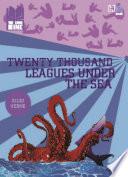
Le Nautilus en brisait les eaux sous le tranchant de son éperon, après avoir accompli près de dix mille lieues en trois mois et demi, parcours supérieur à l'un des grands cercles de la terre. Où allions-nous maintenant, et que nous réservait l'avenir?
Part II, ch. VIII: Vigo Bay
Twenty Thousand Leagues Under the Sea (1870)
